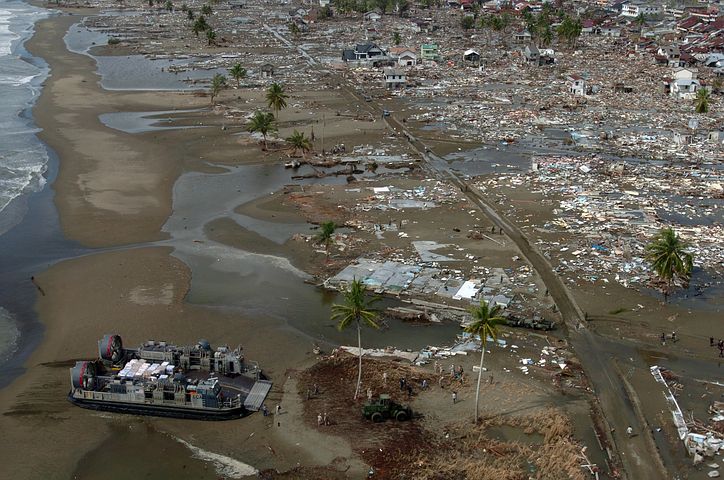リスク対応策 2021.08.20
RM65 事業中断保険へのリスクリテラシー Risk literacy for business interruption insurance
目次
For those who prefer to read this column in English, the Japanese text is followed by a British English translation, so please scroll down to the bottom of the Japanese text.
グローバル・リンクは、巨大地震やサイバー攻撃等、企業経営に甚大な影響を与えるリスクに対するリスクマネジメント・コンサルティングを行っている。その目的は「顧客のTurning Risk to Profit® (リスクの収益化:事業上のリスクを逆に事業収益化することを目的とする企業戦略)を実現すること」であり、そのために信頼性と安定性を最重視する「ソリューション・キャプティブ®」(リスクマネジメント上の課題を解決、企業戦略に「ソリューション(解)」を与えるキャプティブ)を設立、運営管理する、リスクマネジメント分野の専門企業である。
ただ、日本では、「本来はリスクマネジメントの一分野である保険がリスクマネジメントとイコール」と考えられている面もあり、またリスクマネジメントの説明の過程で、「募集を意図せずとも保険の説明も入ってくる」ため、損害保険代理店資格を社員全員が取得、またグローバル・リンクも保険代理店として登録して、「リスクマネジメントと保険」の業際で法的な問題を惹起させないようにしている。
この損害保険代理店資格を取得、更新するためのテキストが、一般社団法人日本損害保険協会が発行している「損害保険募集人一般試験 教育テキスト」である。このテキストは保険代理店としての一般知識を学ぶ「基礎単位」テキスト、他に保険種目ごとに「自動車保険単位」、「火災保険単位」、「傷害疾病保険単位」と取り扱い保険種目ごとにそれぞれテキストがある。
「火災保険単位」テキストの最新版(2021年4月版)、その119ページ「自然災害リスクへの対策」に、筆者にはあまり馴染みが無い言葉が以下のように記述されていた。
リスクリテラシーとは、リスクに接する際、その背景にまで考慮しリスクの波及範囲を正しく見極め、対処する力といわれています。日常生活や企業活動において、リスクリテラシーに基づく日頃からの備えや、有事におけるとっさの判断が大切となります。
自然災害リスクに対しては、個々人がリスクリテラシーを磨くことによって、リスクを的確に判断して行動できるようになり、身の安全確保をはじめとして、より適切な対処方法をとることができるようになります。

1.リテラシー(literacy)
英語で文学や文献を表わす言葉はリタラチャー(literature)である。筆者の手元にある「カレッジクラウン英和辞典(三省堂刊)」には、「文字の」という訳語が付されている言葉「リターラル(literal」)が記載されている。また文字、手紙を表わすレター(letter)という言葉があるが、これらから推測できるように、「literacy」は「文字」という言葉から派生した言葉である。
上記辞書で「literacy」を引くと、「教育のあること、読み書きの能力」とあった。この点から、「特定分野の技能、知識、能力」を意味する言葉になり、現在では「『リテラシー』の前に付く言葉で、その言葉が示す分野の能力を活用すること」を意味する表現として様々な分野で使われている。ニュース情報を吟味して自分自身の見解をつくりあげる、「情報メディアを活用する能力」という意味で「メディアリテラシー」、通信技術分野では「ITリテラシー」、情報分野では「情報リテラシー」等の言葉が登場している。その一つが冒頭の「リスクリテラシー」である。
つまり、リスクリテラシーとは、「リスク感覚を研ぎ澄まして、眼前の事象を鵜呑みにせず、そのモノが有する、またそのモノによって起きる可能性のある事象に関して、自分の眼をそれらの背景にまで注ぎリスクを細密に考察して検討すること」とでも言えるのではないだろうか。
2.事業中断保険(BI: Business interruption Insurance)
新型コロナウイルスの感染拡大によって、多くの企業が影響を受けている。特に飲食業においては、この傾向が顕著である。昨年来より、地方自治体から矢継ぎ早に「酒類の不提供要請」、「時短要請」、更に「休業要請」が出され、その影響で売上が落ち込み、営業損失が拡大している。このような「偶然に発生したリスク、そして起きた事故」によって「事業の中断」を余儀なくされる事態を想定してその補償のために開発された損害保険が、「事業中断保険」である。
事故がなかったら得られたと想定される売上が低下することによって、減少した営業利益を補償する(休業損失の補償)、また事業を中断しているにもかかわらず、事業継続のために支出を要する、人件費、家賃、広告宣伝費等の支出、また罹災後の営業継続や早期復旧のために臨時に支出を要する追加費用(営業継続費用の補償)、これらを総合的に補償する保険である。
しかし、この保険にも「リスクリテラシー」を働かせる必要がある「よく検証しなければならない課題」があることに注意が必要である。それが、保険証券(保険約款)に記載されている「補償範囲」と「免責条項」である。
その理由は、事業中断保険は予見不可能な事象によって失われた収益やそのために必要となった費用を補償する保険であるが、この保険の対象リスクと考えられるものは、「地震、台風、火事」などであり、補償の対象を「企業、事業者の物的財産に損害が発生する事象」に限定して契約しているのが一般的だからである。
2年前には予想もしなかった「新型コロナウイルス」によって引き起こされた事業上の損失を「事故事由」として保険証券で補償される「補償範囲」に入れている契約はまれである。また、「ウイルス、細菌等を原因とする損失または損害は補償しない」との「ウイルス免責」が付帯されている保険も多いため、新型コロナウイルスの影響による「事業中断」を理由に保険求償しても「保険証券(保険約款)上の免責」を理由に保険金の支払いを受けることができないケースもある。
そのため、損害保険の購入を検討する際には、リスクリテラシーを発揮して「保険=安心安全」と考えず「保険のなかにもリスクがある」と保険の内容を十分検証することが必要である。

3.英国、米国での訴訟事例
英国の最高裁判所は、事業中断保険に関して金融行動監督機構 (Financial Conduct Authority (FCA)と保険会社6社が訴訟の場で争い、昨年9月高等法院が下した事案に対して、本年、2021年1月、判決を下した。その内容は、「金融行動監督機構が控訴した4件すべてを支持する判決であり、新型コロナウイルスのパンデミックによる事業中断リスクの損失補償を損害保険会社に命じるもの」であった。
象徴的なものが「疾病」に関する判示の中にあった。通常「疾病」を補償する「疾病特約」は、「被保険者の事業施設内でのみ」疾病が発生したことによって事業中断(BI)が起きた事象を補償するものであるが、裁判所は、「保険の補償範囲が事業施設外にまで拡がっている保険証券」においては、「疾病特約の補償範囲」に関しても事業所内に限定されることなく新型コロナウイルスに起因した「全ての疾病によって起きた事業中断を補償するものである」と判示した。この結果、英国では「事業中断保険」を付保している多くの事業者がこの判決で救われることになったのである。
一方、米国では、ニューヨークのオフプライス・ストア「センチュリー21」が、昨年2020年9月破産法第11条の適用(チャプター・イレブン)を申請して、全13店舗を閉鎖したが、その理由として「事業中断保険の保険金が支払われなかったこと」を挙げていた。このように保険会社の対応に不満を抱いている小売業者は多く、それら多くの企業が保険金の支払を巡って保険会社を提訴している状況である。
その理由は、前述の通り、一般的に事業中断保険は「ウイルスによってひきおこされる世界的規模の感染拡大(パンデミック)」を補償の対象として明示していないからである。「保険約款の曖昧さのなせるわざ」である。そのため、コロナ禍に苦しむ企業は「パンデミックに適用できそうな文言」を探して出しては提訴しているのが現状であり、その動きは議会にまでおよび、州議会に対して働きかけ、ニューヨーク州議会では、「新型コロナウイルス感染症による損失を事業中断保険で補償することを損害保険会社に義務付ける法案」を一部の議員が提出するところまでいった。しかし、「あまりにも保険契約の基盤を無視している」という理由で大多数の議員の賛同は得られていない。
2002年11月中国南部の広東省で発生した、重症急性呼吸器症候群(SARS: severe acute respiratory syndrome)の事案では、一部の保険会社が多額の保険金を支払うことになったため、SARSの流行後「パンデミックによって失われた収益は補償しない」旨を記した「パンデミック免責」を付加することが保険会社に広まった。このため、最近の保険証券には、この「パンデミック免責」が付加されているものが多く、保険の補償範囲が狭まっている。しかし、保険約款には、損害率によっては損害保険会社の裁量に於いて保険金の支払範囲を拡げる意味もあって、「どのようにでも解釈できる文言が多い」のが実情であり、保険約款全体とパンデミック免責との整合性の無さを突かれる訴訟が起きているのもまた事実である。
同じように「事業の一部が中断する」と解釈される、「興業が中止となるリスク」を補償する「興業(イベント)中止保険」には、その「免責」が記載されている。「補償される主なケース」と「補償されない主なケース(免責条項)」は、概ね以下のようになっている。
補償される主なケース
悪天候。交通機関の事故。開催会場が火災等で損害を受け使用することができない。出演者が傷害や病気等で出演することができない。展示物の不着や破損で興業(イベント)が開催できない。
補償されない主なケース
政変や戦争、地震、また主催者の法令違反や過失によって開催できない。主催者の資金の不足や観客の不測によって開催することができない。感染症の発生や発生の恐れがあり開催できない。
今回のような新型コロナウイルス感染症の発生、また地震や戦争等、被害の規模がどこまで及ぶか、その予測が難しい場合は、「保険免責(=補償の対象外)」となっているのである。
但し、この保険の特性として、季節や地域性などを考慮し、「興業(イベント)ごとに補償内容の詳細を決めるオーダーメイドで設計されるため、約款構成からは感染症による中止も補償対象に追加できる可能性も存在しているが、「保険金をお支払いできない主な場合」には、「次のような場合は、保険金のお支払いができません」として、以下の記述があり、第4番目に「Covid-19 新型コロナウイルス」が追加されることが予測されるため、その引受は事実上不可能となっている。
感染症予防法第6条に規定する次の感染症の発生または発生するおそれに起因する損害
・重症急性呼吸器症候群(病原体がコロナ・ウイルス属SARSコロナ・ウイルスであるものにかぎります。)
・鳥インフルエンザ
・新型インフルエンザ等感染症(新型インフルエンザおよび再興型インフルエンザをいいます。)
このように、保険の補償範囲を見る場合は、「補償の範囲」の他、この「保険金のお支払いができません」という、「免責条項」も注意深く検証しておく必要がある。「補償」と「免責」の両面に、リスクリテラシーを働かせることが重要なのである。
さらに、「個人の疾病、生死を補償する生命保険」と「巨大リスクをも補償する損害保険」は、「新型コロナ」という同じリスクであっても、それぞれの保険が果たす役割・社会的使命の違いによって、「予測される支払保険金の額」には非常に大きな違いが生じ、その影響度では保険会社経営に大きな違いが出るものである。この認識のもと「補償範囲」に関しては、「同じ保険業界だから、同じリスクなら生命保険でも損害保険でも対応は同じだろう」という憶測で「補償範囲」を考えないことが、また重要である。

今回のまとめ
先週金曜日、8月13日に配信された米国の大手保険専門誌「Business Insurance」によると、「米国連邦裁判所は、NBA(ナショナル・バスケットボール・アソシエーション)のロサンゼルス・レイカーズが、大手損害保険会社を相手に起こした新型コロナウイルスによる『事業中断』の訴訟については、『新型コロナウイルスは、訴状にあるように、直接的な物理的損失・損害をロサンゼルス・レイカーズにもたらしたという主張は認められない』と却下した」とあった。カリフォルニア州の法律では、「直接的な物理的損失とは、被保険者の財産が実際に変化することを意味する」とされているからである。
このように欧米では事業中断保険を巡る報道は多いが、日本では、「事業中断保険に関して保険会社との意見の食い違いが・・」ということが報道されることもなく、また聞くこともない。この欧米では「当たり前に掛ける保険」である「事業中断保険」を掛けている企業が少ないからであり、そもそもこの保険の存在を知らない企業も多いのではないだろうか。
同じ「地震保険」であっても、日本で一般的に販売されている地震保険が「物的損害」のみを補償するのと比べ、欧米で販売されている地震保険は「物的損害:PD(Property Damage)」に加え、地震による「事業の中断による収益の低下:BI(Business Interruption)」を補償するものになっている背景はここにあると考えている。日本では、損害保険会社があまりお勧めしていないのか、それとも企業側が「必要では無い」と考えているのか、しかし事業中断保険の重要性は今回の新型コロナウイルスのパンデミックの事態を受けて大きく変化した。ちょうど、東日本大震災による甚大な被害を受けて地震保険に対する需要が高まったように。
こういった点からも、単に保険会社、保険代理店からのお仕着せで保険条件を見るのではなく、「リスクリテラシー」を存分に働かせて「我が社のリスクは、いま掛けている保険で本当に十分に補償されているのか」と吟味、検証することが必要なのではないだろうか。この「リスクリテラシーを働かせること」を別の言葉で言うと「リスクマネジメント」となる。キャプティブを視野にした本格的なリスクマネジメントが必要であると新型コロナによる欧米での「事業中断保険」を巡る課題が教えてくれているのではないだろうか。
執筆・翻訳者:羽谷 信一郎
English Translation
RM65 – Risk literacy for business interruption insurance
Global Link is a risk management consultancy specialising in the management of risks such as earthquakes and cyber-attacks that can have a significant impact on business operations. Global Link’s objective is to help clients turn Risk to Profit® (a corporate strategy that aims to turn business risks into business profits). To this end, the company is a specialist in the field of risk management, setting up, operating and managing Solution Captives® (captives that solve risk management problems and provide “solutions” to corporate strategies) with a focus on reliability and stability.
In Japan, however, there is a tendency to equate insurance, which is essentially a part of risk management, with risk management, and the process of explaining risk management involves explaining insurance, even if it is not intended to be a solicitation. Therefore, all employees are qualified non-life insurance agents, and Global Link is also registered as an insurance agent, to avoid any legal issues arising from the business of risk management and insurance.
The textbook for obtaining and renewing the non-life insurance agent qualification is the “Non-Life Insurance Agent General Examination Training Textbook” published by the General Insurance Association of Japan. The textbook includes a “basic unit” textbook, which teaches general knowledge as an insurance agent, and other textbooks for each insurance category, such as “automobile insurance unit”, “fire insurance unit” and “accident and sickness insurance unit”.
In the latest edition (April 2021) of the “fire insurance unit” textbook, page 119, “Measures to deal with natural disaster risks”, I found the following description of a term that is not familiar to me.
Risk literacy is said to be the ability to correctly assess and deal with risks, considering their background. In our daily lives and in our business activities, it is important to be prepared daily based on risk literacy and to be able to make quick decisions in case of emergency.
By improving their risk literacy, individuals will be better able to assess risks and act accordingly and will be able to take more appropriate measures to deal with natural disaster risks, including ensuring their own safety.
1. literacy
The English word for literature is literature. The word “literacy” is derived from the word “letter”, as can be inferred from the word “literal”, which is translated as “of letters” in the ” College Crown English-Japanese Dictionary” (Sanseido) which I have. The word “literacy” is derived from the word “letter”.
The word ” literacy” in the above dictionary means “to have education, the ability to read and write”. From this point, the word has come to mean “skill, knowledge or ability in a particular field”, and is now used in various fields as an expression meaning “a word prefixed to the word ‘literacy’ and the use of ability in the field indicated by that word”. Words such as “media literacy” in the sense of “the ability to use the information media”, “IT literacy” in the field of communication technology, and “information literacy” in the field of information have appeared. One of them is the “risk literacy” mentioned at the beginning of this article.
In other words, risk literacy can be described as “sharpening one’s sense of risk, and not just taking events in front of one’s eyes for granted but putting one’s own eyes into the background of the events that the thing has or may have and considering the risks in detail”.
2. Business interruption insurance (BI)
Many businesses have been affected by the spread of covid-19. This is particularly the case in the restaurant industry. Since last year, local authorities have been issuing a barrage of requests to not serve alcohol, to reduce hours, and to close businesses. Business Interruption Insurance has been developed to compensate for such “business interruptions” caused by “accidental risks and accidents”.
It compensates for the loss of operating profit due to the loss of sales that would have been made without the accident (compensation for loss of business), as well as for the expenditure of labour, rent, advertising and other costs that must be paid to continue the business despite the interruption, and for the additional costs that must be paid temporarily to continue the business after the disaster and to restore it quickly (compensation for business continuity costs).
It should be noted, however, that there are some “issues that need to be examined carefully” which require “risk literacy”. The reason for this is the “scope of coverage” and “exclusions” in the insurance policy.
The reason for this is that business interruption insurance is designed to compensate for the loss of profits and expenses caused by unforeseeable events, but the risks covered by this insurance are limited to “events causing damage to the physical property of the company or business”, such as “earthquakes, typhoons and fires”.
Rarely do policies include business losses caused by the “covid-19 virus”, which was unexpected two years ago, as an “accidental event” within the “scope of coverage” covered by the policy. In addition, many insurance policies include a “virus exclusion”, which states that they do not cover loss or damage caused by viruses, bacteria, etc. Therefore, even if an insured makes a claim for “business interruption” because of covid-19, the insurer may not be able to pay the claim due to the “exclusion in the insurance policy”.
Therefore, it is necessary to exercise risk literacy and not to think that “insurance = safety and security”, but to fully examine the contents of the insurance that “there are risks in the insurance”.
3. Litigation in the UK and US
In January 2021, the UK Supreme Court ruled on a case brought by the Financial Conduct Authority (FCA) and six insurers regarding business interruption insurance, which was decided by the High Court last September. The judgement “upholds all four of the FCA’s appeals and orders the insurers to compensate for the risk of business interruption caused by the new coronavirus pandemic”.
Symbolic of because on “disease”. Normally, a “sickness clause” covering “sickness” would cover a business interruption (BI) event caused by an outbreak of sickness “only on the insured’s business premises”, but the court held that “where the policy extends coverage beyond the business premises”, the “sickness clause coverage” is not limited to the business premises. However, the Court held that in a “policy which extends its coverage beyond the business premises”, the “sickness clause’s coverage” is not limited to the business premises but “covers business interruption caused by any illness” caused by covid-19. As a result, many businesses in the UK with ” business interruption insurance” were saved by this decision.
Meanwhile, in the US, Century 21, an off-price store in New York, filed for Chapter 11 bankruptcy protection last September 2020 and closed all thirteen shops, citing “failure to pay for business interruption insurance” as the reason. Many retailers are unhappy with the insurer’s response, and many of them are suing the insurer over the claims.
This is because, as noted above, business interruption policies generally do not specify that they cover “a pandemic caused by a virus”. This is “the result of ambiguity in the terms and conditions of the policy”. As a result, companies suffering from covid-19 have been searching for “language that could be applied to a pandemic” and filing lawsuits, and this trend has reached the legislature, with the New York State Assembly passing a bill requiring insurance companies to provide business interruption coverage for losses caused by covid-19 infections. In the New York State Legislature, some legislators have introduced a bill to require insurance companies to provide business interruption insurance to cover losses caused by covid-19 infections, but this has not been supported by most legislators.
In the case of the severe acute respiratory syndrome (SARS) outbreak in the southern Chinese province of Guangdong in November 2002, some insurers paid out so much money for the SARS epidemic. As a result, many recent insurance policies have added this “pandemic exemption”, narrowing the scope of insurance coverage. However, there are many clauses in the insurance policy which can be interpreted in any way, meaning that the insurance company can extend the coverage at its own discretion depending on the loss ratio, and it is a fact that lawsuits have been filed to challenge the inconsistency between the insurance policy as a whole and the pandemic exemption.
Similarly, the “cancellation of entertainment (event) insurance”, which covers the “risk of cancellation of entertainment”, interpreted as “partial interruption of business”, contains an “exclusion”. The “main cases covered” and “main cases not covered” (exclusions) are generally as follows.
Main cases covered
Severe weather. Traffic accidents. The venue is damaged by fire or other causes and cannot be used. Performers are unable to perform due to injury or illness. Inability to hold an event due to non-delivery or damage to exhibits.Main cases of non-coverage
The event cannot be held due to political upheaval, war, earthquake, violation of the law or negligence of the organiser. Inability to hold the event due to insufficient funds or unforeseen audience. The event cannot be held due to an outbreak or threat of an outbreak of an infectious disease.
In the event of an outbreak of covid-19, such as this one, or in the event of earthquakes, wars, etc., where it is difficult to predict the extent of the damage, there is an “insurance exclusion”.
However, as a characteristic of this insurance, it is designed in a tailor-made manner to determine the details of coverage for each entertainment (event), considering seasonal and regional characteristics, etc. Therefore, there is a possibility that the cancellation due to infectious diseases can be added to the coverage based on the structure of the policy. However, the following statement is stated in the “Main cases where insurance payments cannot be made” section: “Insurance payments cannot be made in the following cases”, fourth “Covid-19 novel coronavirus” is also expected to be added, making its underwriting virtually impossible to underwrite such cases.
Damage caused by the outbreak or threat of outbreak of any of the following infectious diseases as defined in Article 6 of the Infectious Disease Prevention Law
severe acute respiratory syndrome (only if the pathogen is the corona virus genus SARS corona virus)
Avian influenza
Avian Influenza – New Influenza and other Infectious Diseases (New Influenza and Re-emerging Influenza)
When looking at the coverage of a policy, in addition to the “scope of coverage”, it is necessary to carefully examine the “exclusion of liability” clause, which states that the policy will not pay out. It is important to be risk literate when looking at both “coverages” and “exclusions”.
Furthermore, the difference in the role and social mission of life insurance, which covers individual illness and life and death, and non-life insurance, which covers huge risks, can make an enormous difference to the expected payout of the same risk – covid-19. This can make a significant difference to the management of an insurance company. With this in the background, it is important not to assume that life and non-life insurers will handle the same risks in the same way because they are in the same industry.
Summary of this issue
According to “Business Insurance”, a leading insurance magazine in the U.S. distributed last Friday, August 13, “The U.S. Federal Court has ruled that the ‘business interruption’ lawsuit brought by the Los Angeles Lakers of the National Basketball Association (NBA) against a major property and casualty insurance company due to covid-19. The U.S. Court of Appeals dismissed the Los Angeles Lakers’ lawsuit against a major property and casualty insurer, stating that it “does not find that covid-19 caused the Los Angeles Lakers any direct physical loss or damage as alleged in the complaint. This is because, under California law, “direct physical loss means an actual change in the insured’s property”.
As you can see, there is a lot of press coverage of business interruption insurance in Europe and the US, but in Japan, you don’t hear or see anything about “disagreements with insurance companies about business interruption insurance”. The reason for this is that few companies in Japan carry business interruption insurance, which is a widespread practice in Europe and the US, and many companies may not even know that it exists.
This is the reason earthquake insurance sold in Europe and the US covers not only PD (Property Damage) but also BI (Business Interruption) while the earthquake insurance commonly sold in Japan covers only property damage. In Japan, the importance of business interruption insurance has changed dramatically in the wake of the recent covid-19 pandemic, either because it is not recommended by non-life insurers or because companies do not think it is necessary.
In Japan, the importance of business interruption insurance has changed dramatically in the wake of the recent covid-19 pandemic, either because it is not recommended by non-life insurers or because companies do not think it is necessary. Just as demand for earthquake insurance has increased in the wake of the devastation caused by the Great East Japan Earthquake.
In this light, we should not simply look at insurance terms and conditions as they are tailored by insurance companies and agents, but we should use our “risk literacy” to the fullest to examine whether the insurance we have is sufficient to cover our risks. Another word for this “risk literacy” is “risk management”. The issue of “business interruption insurance” in Europe and the US due to covid-19 may teach us that serious risk management with a captive in mind is necessary.
Author/translator: Shinichiro Hatani

